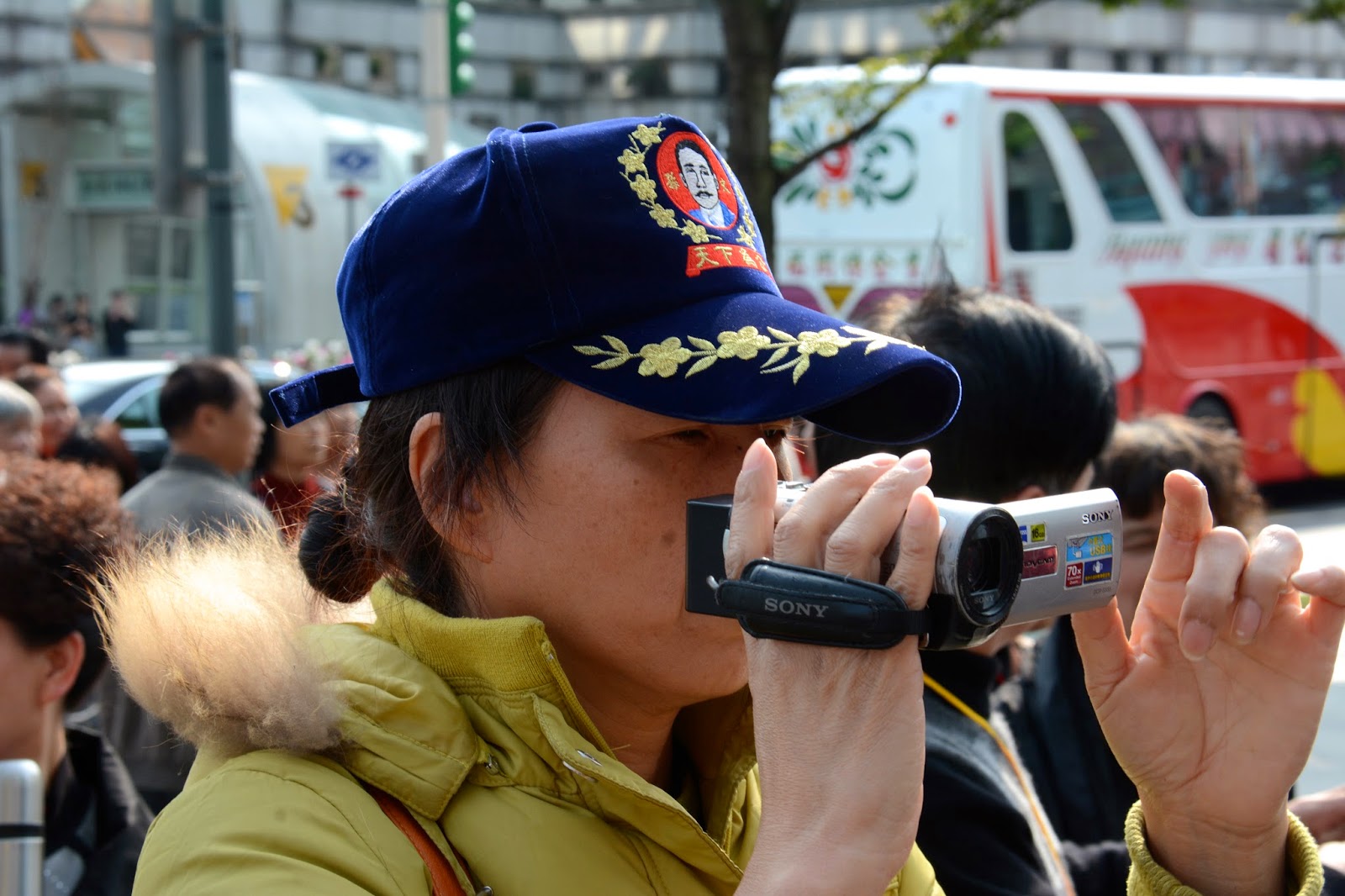Taiwan’s laws on
foreigners’ involvement in protests and political activity are strict. But when
Chinese tourists do it, the authorities tend to look the other way
If you have a
heart condition, high blood pressure, get angry easily or have a tendency to
engage in fistfights, here’s a friendly piece of advice: Don’t ever come near
the Xinyi entrance to the Taipei 101 skyscraper.
I’ve always had
a special fondness for the building, and this was the first landmark that I was
keen on visiting after my arrival in Taiwan back in 2005. For two years or so,
I lived in the immediate neighborhood and often spent time there shopping,
enjoying a meal, or sitting down with a cup of coffee and a book.
Then, after Ma
Ying-jeou was elected president and gradually relaxed longstanding rules on
Chinese tourism, things changed. It was subtle at first, with the thick Chinese
accent of visitors occasionally making heads turn. Now, with more than 3 million Chinese
arrivals in Taiwan in 2013, they’ve completely ruined it. Throngs of Chinese
tourists now occupy the area, and the groups’ behavior is enough to make anyone
who loved the place swear never to go back: They are loud, rude, cannot line up,
will get in your way, push you — and that’s not to mention those who cannot
help themselves and need to remind cleaning ladies and other employees that the
Chinese have landed, and that they are Taiwan’s “money gods.”
 |
| Taiwanese, left, PRC citizen, right |
This also happens to be the point of disembarkation for Chinese tour groups, which I suspect is no coincidence, as the pro-unification minority in Taiwan probably seeks to create the impression that they actually matter as a political force. Every day, hundreds, probably thousands of Chinese tourists are exposed to such a spectacle.
Now, Taiwan is a
democracy, and we enjoy free speech. As such, I have no problem with Taiwanese
— or, to put it officially, citizens of the Republic of China (ROC) —
expressing their political views, even if, personally, I regard their desire
for unification with a country run by a murderous and tyrannical regime utterly
naïve, if now downright abhorrent. What I have a problem with, however, is the
authorities’ double standards in the application of laws barring foreigners
from engaging in political activity.
With nothing
better to do on a sunny Saturday afternoon, I reluctantly visited the area to
snap a few pictures, aware that around 2pm or so the same group would
materialize and occupy the entrance. Sure enough, they were there, the huge
flags fluttering like rivers of blood (I’m sorry, but the PRC flag gives me the
chills). A few hundred people, all of them Chinese tourists, formed a circle
round them, laughing and applauding. A few were engaged in talks with one of
the organizers. One woman next to me kept giggling, probably in reaction to the look on my face. Two cops were on the side, looking on silently.
 |
| Chinese tourists waves the flag |
I went over to
the cops and asked them whether this was legal. “Yes it is,” the younger of the
two told me. “This is a public space.” Fair enough, I said, but you’re aware
that those are not Taiwanese. Chinese tourists — foreigners — are taking part
in what obviously constitutes political activity. “No,” he answered, smiling.
“Those are all Taiwanese.”
The cop must
either have thought I was a complete cretin, or that I was blind (or both). Not only did
the participants not look one bit Taiwanese, but I’d seen them get off the bus
and they all wore a little sticker on their sleeve identifying them as part of
a Chinese tour group. “Those are Chinese,” I
retorted. But by then, it was clear that the cops were no longer interested in
talking to me and stared straight ahead, probably hoping I’d go away. One of the
participants, a woman with a cap of Sun Yat-sen and a handheld camera, came over. She’d evidently overheard our conversation and
felt she had to say something. “They’re not foreigners,” she said. “We’re all Chinese!”
I retorted that we were in Taiwan, that this wasn’t China, whereupon, seized with anger, she
hollered that Taiwan is part of China and that I should mind my goddamn
business anyway because I’m a foreigner in this land. With a wave of my hand, I
told her to get lost, while the cops politely asked her to go away.
 |
| The woman who told me to get lost |
What I would
also have liked to ask the cops was to explain why, during the annual Free
Tibet parade marking the 55th anniversary of the PLA invasion of
Tibet last Sunday, police and security staff at Taipei 101 were asking participants not to
approach the plaza and to stay away from the sidewalk. One of them extended his arms and prevented two activists from getting closer. I was there, but sadly I
didn’t bring my camera that day (I’d been drinking expensive red wine and brandy
with a recently appointed minister). Even more puzzling is the fact that the
said participants (one of them is a friend) were quite evidently Taiwanese — in other words, ROC
citizens, fully entitled to hold protests and to express their views in their own
land. Apparently that, too, was unacceptable.
With this, I can
only conclude that the Chinese now enjoy extraterritorial rights in Taiwan,
rights that, needless to say, trump those of mere foreigners like myself and,
more importantly, those of Taiwanese. (Photos by the author)


No comments:
Post a Comment